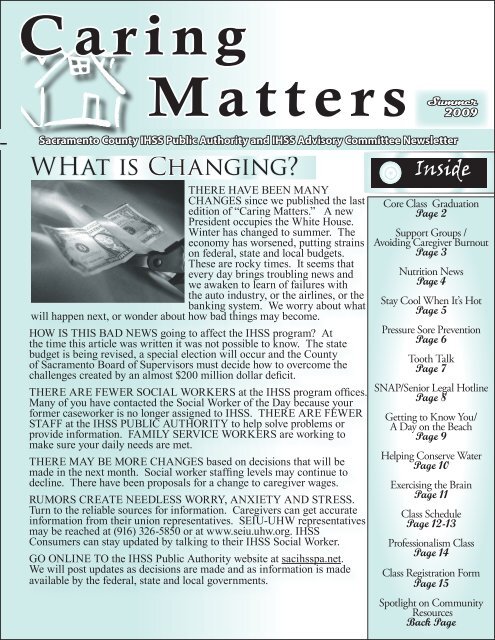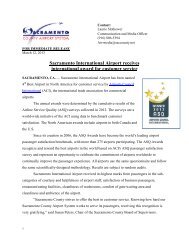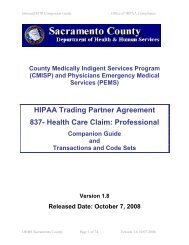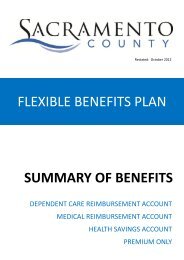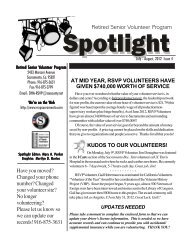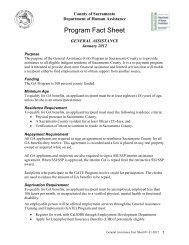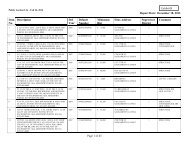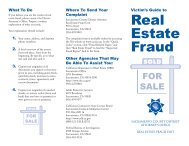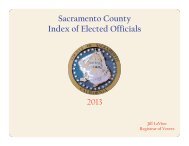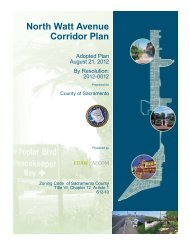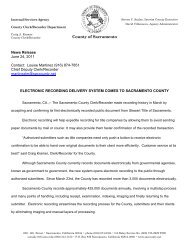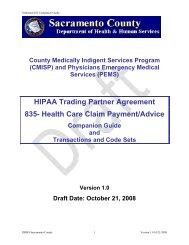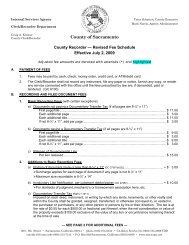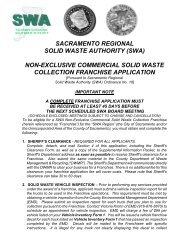Caring Matters - Sacramento County IHSS Public Authority
Caring Matters - Sacramento County IHSS Public Authority
Caring Matters - Sacramento County IHSS Public Authority
Create successful ePaper yourself
Turn your PDF publications into a flip-book with our unique Google optimized e-Paper software.
C a r i n gM a t t e r sSummer2009<strong>Sacramento</strong> <strong>County</strong> <strong>IHSS</strong> <strong>Public</strong> <strong>Authority</strong> and <strong>IHSS</strong> Advisory Committee NewsletterWHat is Changing?THERE HAVE BEEN MANYCHANGES since we published the lastedition of “<strong>Caring</strong> <strong>Matters</strong>.” A newPresident occupies the White House.Winter has changed to summer. Theeconomy has worsened, putting strainson federal, state and local budgets.These are rocky times. It seems thatevery day brings troubling news andwe awaken to learn of failures withthe auto industry, or the airlines, or thebanking system. We worry about whatwill happen next, or wonder about how bad things may become.HOW is this bad news going to affect the <strong>IHSS</strong> program? Atthe time this article was written it was not possible to know. The statebudget is being revised, a special election will occur and the <strong>County</strong>of <strong>Sacramento</strong> Board of Supervisors must decide how to overcome thechallenges created by an almost $200 million dollar deficit.THERE ARE FEWER SOCIAL WORKERS at the <strong>IHSS</strong> program offices.Many of you have contacted the Social Worker of the Day because yourformer caseworker is no longer assigned to <strong>IHSS</strong>. THERE ARE FEWERSTAFF at the <strong>IHSS</strong> PUBLIC AUTHORITY to help solve problems orprovide information. FAMILY SERVICE WORKERS are working tomake sure your daily needs are met.THERE MAY BE MORE CHANGES based on decisions that will bemade in the next month. Social worker staffing levels may continue todecline. There have been proposals for a change to caregiver wages.RUMORS CREATE NEEDLESS WORRY, ANXIETY AND STRESS.Turn to the reliable sources for information. Caregivers can get accurateinformation from their union representatives. SEIU-UHW representativesmay be reached at (916) 326-5850 or at www.seiu.uhw.org. <strong>IHSS</strong>Consumers can stay updated by talking to their <strong>IHSS</strong> Social Worker.GO ONLINE TO the <strong>IHSS</strong> <strong>Public</strong> <strong>Authority</strong> website at sacihsspa.net.We will post updates as decisions are made and as information is madeavailable by the federal, state and local governments.InsideCore Class GraduationPage 2Support Groups /Avoiding Caregiver BurnoutPage 3Nutrition NewsPage 4Stay Cool When It’s HotPage 5Pressure Sore PreventionPage 6Tooth TalkPage 7SNAP/Senior Legal HotlinePage 8Getting to Know You/A Day on the BeachPage 9Helping Conserve WaterPage 10Exercising the BrainPage 11Class SchedulePage 12-13Professionalism ClassPage 14Class Registration FormPage 15Spotlight on CommunityResourcesBack Page
CaregiverCore class graduation 2009Amy BradberryVeronica ChenowethAntonia HinojosaCarolyn RoseGraduates not pictured: John Campbell, Anna Cherkez, Alice F. Davis,Erica Flagg, Geraldine Gawellek, Ashok Humar and Tena RobinsonDelores SimmonsGeanine TroutRaisa TsyatskaDiannia WalkerHATS OFF TO OUR GRADUATES !!!!On April 1,the <strong>Public</strong> <strong>Authority</strong> hosted the 3 rd Annual Core Class Graduation ceremony forthe Class of 2009. Family, friends and consumers watched as each graduate stepped forwardto receive their certificates from <strong>Public</strong> <strong>Authority</strong> Executive Director Bernadette Lynch andEskaton Senior Connection Director, Terry McPeek, R.N. (pictured above left). Attendeesenjoyed light snacks while mingling in the beautifully decorated room and waited to takepart in the raffle for gift baskets. Each graduate was happy to win a prize, but all agreed thatthat biggest winners of the evening were <strong>Sacramento</strong> <strong>IHSS</strong> consumers ~ who will benefitfrom the training and education of their caregivers!WILL YOU JOIN US FORGR ADUATION NEXT YEAR?To become a Core graduate you must completeat least one class in each of the six Core ClassCategories. Those are safety, mobility, nutrition,medication management, personal care andcommunity resources. These Core classes areidentified by a picture of an apple next to them onthe class schedule. All classes are free and mostwill be held at the Adult Services Building.We hope to see you at the core classes and thatYOU will be in next year’s graduating class!Antonia Hinojosa and Family
Advocate forJean DensonSupport Groupsby Mary-Ann Cowan<strong>Matters</strong>There is no cost to attend the supportgroup. Some members attend intermittently,while others come on a more regular basis.Registration is not required.The South Area Support Group meetson the first and third Friday of everymonth from 1:00 p.m-2:30 p.m. Thelocation is the Martin Luther King Jr.Library, 7340 24th Street Bypass,<strong>Sacramento</strong>, CA, 95822.It was a beautiful Friday morning when we metwith Jean Denson, a dedicated caregiver who isnot afraid to ask for help. She was a memberof the Caregiver Support Group. We wantedto gain Jean’s perspective on what value shegained from attending support group meetings.Jean is a wonderful, caring, intelligent personwho has devoted most of her life caring for hermother for whom Jean has a deep love, respectand admiration. Jean learned of the CaregiverSupport Group and decided to join. Sheremained active in it for the next five years.Jean said, “I developed a sense of family withmembers from the support group. I gaineda lot of clarity on issues.” Jean enjoyed theinteraction and group dynamics; it helped herdeal with stress and increased her coping skills.Jean remarked, “Everyone who is caring for achild or adult with a disability would benefit froma support group.”HOW TO AVOIDCAREGIVER BURNOUTby Marshay HunterVicarious trauma can be a naturalreaction when you are around peoplewho are in crisis or who have lots ofproblems and concerns. Caregiversmay develop vicarious trauma whenthey care for someone who has substantialhealth concerns or who has justexperienced some type of crisis.Effective strategies for maintaining thewell being of service providers:•Physical - Eat Healthy, Adequate Rest,Dancing, Walking, Jogging•Psychological - Reading, Self-Reflection,Journaling, Smiling, Trying NewActivities•Emotional - Cry, Laugh, Visit Friends,Visit Family, Praise Yourself•Workplace - Set Boundaries, TakeBreaks, Vacation, Create Quiet Time, PeerSupport
ConsumerNutrition News for SeniorsAswe age, our relationship to foodchanges along with our bodies.In later life, however, eating wellcan be the key to staying mentally sharp,emotionally balanced and energetic. Eating awell balanced diet helps build a strong immunesystem and enhances the possibility of a positiveoutlook on life.Light and nutritious meals are both pleasingto the senses and supply sufficient caloriesfrom a wide variety of foods. The key is toeat moderate portions. Nutrient-dense mealsof vegetables, whole grains, and fruit suppliesvitamins, minerals, fiber, protein, complexcarbohydrates and unsaturated fats for ahealthier you. Many meals can be simple toprepare, are appealing to the eye and easy onthe palate.Healthy eating is an opportunity to expandthe range of choices with flavorful mealsthat will help you look forward to mealtimes.Maintaining a healthy diet can yield numerousbenefits, and an emphasis on good nutrition cangenerate an improvement in your quality of life,mobility, and emotional well-being.by Debra KahanHere is a healthy recipe to use during the hot summer.A great tip is to cook your pasta in the cool of themorning. The salad can chill in your refrigerator duringthe heat of the day. There will be a nice, cool dinnerwaiting for you when the day is the hottest!PASTA SALAD WITH TUNAIngredients:1 can water-packed tuna3 cups uncooked pasta (you can useelbow macaroni or shells or corkscrew)3 stalks celery1 small onion2 cups frozen peas (thawed)Cook the pasta according to packagedirections. Drain. Chop the onion and thecelery then mix it with the tuna.Make the dressing:¾ cup Light Miracle Whip or LightMayonnaise½ cup plain yogurt1 tbsp vinegar (either apple cider or plainwhite)Pepper to tasteMix the dressing ingredients together.Add the dressing to the tuna and mix well.Combine the pasta and the tuna mixture.Rinse and drain the peas. Add to the tunaand pasta mixture. Stir to mix all together.Chill before serving.Makes four servings.
<strong>Matters</strong>Stay cool when it’s hot10 Ways to Beat the Summer Heatby Debra LarsonWe all know to be careful in <strong>Sacramento</strong>’s scorching summer weather, but did you know that heatcan be deadly? Over 400 people in the United States die every year from heat-related causes andover half of those victims are 65 or older.The elderly, people with some kinds of chronic illnesses and those taking certain medications aremuch more at risk for heat-illnesses because their bodies are less efficient in reacting to the heat.When there is a long, extended heat wave it becomes even harder to stay healthy because prolongedexposure to the heat takes a toll on our bodies by compromising its ability to cool itself.There are lots of things that can be done to stay safe and enjoy the summer. Here are ten of them:1. Limit your exposure to outdoor and indoor heat.2. Take a cool shower or bath.3. Don’t run appliances when it’s hot.a. No oven ~ eat light, healthy food that doesn’t need to be cooked.b. No dryer ~ use the dryer and dishwasher after the heat of the day is over.c. No light bulbs ~ turn off lights because they create heat.4. Use wet, cool towels around your face and neck.5. Keep a misting spray bottle with cool water nearby to cool off.6. Dress in light fabrics like cotton.7. Spend time in air-conditioned buildings like malls, libraries, museums, andsenior centers.8. Plan outdoor activities for the cool of the morning and evening.9. Keep curtains, shades and blinds drawn during the daytime.10. If you have to go outdoors, stay in shaded areas near trees or water.NEED HELP WITH ENERGY BILLS????Don’t let the cost of keeping your home cool make you hot under the collar. Here aresome important phone numbers for energy assistance.HEAP, financial assistance (916) 567-5200Salvation Army, financial assistance (916) 442-0303CARE, PG&E Discount Program (866)743-2273SMUD Energy Assistance Program Rate (EAPR) (888)742-7683
HealthThe Best Way to Treat Pressure Sores is PREVENTION!by Terry McPeek, RNEskaton Senior ConnectionThe largest organ in the body is one that many people don’t think of as an organ at all– your skin! Skin care is especially important to those who are bed-bound because theirskin is under more stress than most. Those who are bed-bound must be regularly turnedfor comfort and to protect against pressure sores.Our skin is nourished by tiny blood vessels which deliver fresh blood, containing oxygenand nutrients to the tissues. Deprived of those necessities, the skin tissues begin to die.A pressure sore, also known as a decubitus (de-kyu-bi-tus) ulcer or “bed sore” can beginwith something as simple as a skin tear or a red area on the skin. As we age, the skinbecomes thinner and loses fat beneath the upper layer, increasing the risk of developingthese lesions, which result from unrelieved pressure on the skin. But age is not the onlyfactor - anyone who is unable to move around in bed easily is at risk of developing thesepainful sores.There are several ways to reduce the risk of developing pressure sores:• Positioning: Use pillows and foam padding to keep limbs and body in place. Transitionto a new position at least every two hours. If the person can sit in a chair, theposition should be changed hourly. Positioning should always be done to reduce pressureover the bony points on the body such as hip bones, tailbone, shoulder blades and heels.• Reduce friction on skin: Even soft sheets can cause friction when rubbing over thesame area repeatedly. Watch heals and the tips of the toes for sheet friction and “tent” thesheet over the feet if necessary. When turning a bed bound person you can use a lift sheetto prevent “dragging” the body over bedding.• Inspect and protect skin: Check the person’s skin for tears or red areas. Think of apressure sore as an “iceberg.” While you can see the “tip” of the iceberg (a small red area)the affected area is actually much larger, beneath the underlying layers of skin. Never rubdirectly on a red patch or pressure sore – the goal is to increase circulation to surroundingtissues to promote healing. If a red mark is present after relieving pressure from the areafor more than a few hours, call your health care provider for advice.• Hydration and Nutrition: While it is important for any client to receive propernutrition and fluids, it is particularly the case with anyone recuperating from a bed sore.***As previously stated, a persistent red mark is a cause for concern as is any broken skin thatdoes not heal quickly. Seek immediate medial care if you detect signs of infection, fever,drainage or an odor or increased heat and redness in the surrounding skin.
<strong>Matters</strong>tooth talkby Debra LarsonGetting older changes everything, even theway that we have to take care of our teeth.Many of the diseases that affect us and someof the medicine that we take for our illnessescan affect our oral health. Those who havea disability or medical condition are at evengreater risk for oral problems.Only 22% of older persons are coveredby private dental insurance. Most dentalexpenses for the elderly are paidout of pocket.Dental disease and oral problems can makeus sick. Our mouths are the sites for diseasesand infections that can become bloodborneor be taken into our lungs; therefore, it’s veryimportant to maintain good dental health andhygiene. Our mouths are also a place wheregerms and bacteria can get into our body andcause oral infections.In 1993, one-third of noninstitutionalizedadults aged 65 and over reported havinglost all their natural teethOral health affects the general health forseniors and the disabled. Dental problemscan prevent us from eating a healthy andnutritious diet due to the pain of chewing ordifficulty in swallowing. Of course, if we can’teat nutritiously, then we are at increased riskfor illness associated with nutritional disorders.Oral problems may also lead to difficultyin speaking or alter speech patterns.Of adults aged 65 and older, 7% reporthaving tooth pain at least twice in thelast six months.<strong>Caring</strong> for teeth, and helping others care fortheirs, is easier than you think! If you havereal teeth, brush them in the morning and atnight. Regular manual toothbrushes may bedifficult to use for people with physical limitations,but toothbrushes can be adapted. Buildup the handle to make it easier to hold bywrapping it with a washcloth, aluminum foil ora sponge hair roller.For partial tooth loss or total tooth loss:Clean dentures and partials daily. Be carefulwhen handling these devices; they can breakif dropped in a hard sink. Use a denture brushor toothbrush.For those with Alzheimer’s: Soon after diagnosis,consult with your dentist. As thedisease progresses both the ability to care foryour teeth and to cooperate with dental careproviders will decline. It may become difficultto talk about problems or dental pain. Caregiverswill need special training to providedaily oral care and to screen for dentaldisease.
ConnectionSNAP- Supplemental Nutritional Assistance ProgramIS THE HIGH COST OF GROCERIES GETTING YOU DOWN?YOU MAY BE ELIGIBLE FOR HELP!The program that used to be called “Food Stamps” is changing andwill soon have a new name – SNAP. That stands for SupplementalNutritional Assistance Program.More than the name is changing; the way you can buy groceriesis changing too! If you qualify, you will receive a plastic card that isused like an ATM card. Each month, money is added to your card.It doesn’t take extra time when you check out and nobody will knowthe difference between a SNAP card and an ATM card.It’s even easier to qualify if you are over sixty or disabled. You can own your own home anda car. You can have up to $3,000 in your bank account or in cash.It’s easier to apply! You can have someone else apply on your behalf; you might not need toattend an in-person interview. You can obtain an application by mail and mail it in.Would you like some help to apply?The following resources can be helpful Call the California SNAP Hotline at (877) 847-FOODYou can learn where to apply for benefits Contact the <strong>Sacramento</strong> Hunger Coalition at (916) 447-7063 extension 335 Learn more online at www.fns.usda.gov/fspThis website, operated by the US Department of Food and Agriculture, answersmany questions about eligiblity for benefits. You can even download an application Call the Senior Legal Hotline if you have been wrongly denied benefitsSENIOR LEGAL HOTLINEBy Debra LarsonIf you are over 60 in California, you can get free advice over the phone from the SeniorLegal Hotline about food assistance or any other legal issue. Call (916) 551-2140 in<strong>Sacramento</strong> or (800) 222-1753 toll-free in California, Mon.-Fri. 9-12 and 1-4 and until7pm on weekends. You can also submit your question by email to their website atwww.seniorlegalhotline.org.
Getting To Know You...Bari Schlesinger<strong>Matters</strong>by Ron Meier andMary-Ann CowanThis month’s featured<strong>Public</strong> <strong>Authority</strong>Advisory Committeemember is BariSchlesinger.When we spoke withBari we were completelycaptivated by her joy oflife attitude, razor sharp mind and impressiveintellect.Bari is currently employed as an AssociateGovernmental Program Analyst with the stateof California Department of Rehabilitationand has been with the department for over 17years. She told us she heard of the AdvisoryCommittee when reading the newsletter. Herinterests were peaked because, “I have used<strong>IHSS</strong> Caregivers in my life every day since myteen years.”When asked what would she tell others aboutthe Committee that might interest them inparticipating she said, “I wanted to have a voicein letting the Committee know what I haveencountered as a consumer of <strong>IHSS</strong> servicesand bring my unique experiences to the tableto educate others who could learn from myobservations and involvement in this area.Make them understand that you have good daysand bad days, and be able to ask for sufficienthours to take care of yourself so that you arecovered when you have bad days….You won’thave all good days.” She wants people to knowcaregivers make it possible for her to remain asindependent as possible.Advisory Committee Corner“A Day on the Beach”By Denise BlockmonThe 17th annual “Day on the Beach” onCowell’s Beach, Santa Cruz, Californiawill be held Saturday, July 18, 2009, from12 noon until 5 pm.This event creates an opportunity for thosewho, due to their disabilities, might neverhave dreamed of participating in oceansports such as kayaking, outrigger canoeing,scuba diving, water floatation, orusing beach wheelchairs. The event servesmore than 200 persons with disabilities,plus their caregivers, friends, families.Over 1,000 people are expected at thisspectacular beach party—and it’s all free.Volunteers place about 160 plywood sheetson frames over the sand to enable thosewith mobility issues to participate in theactivities. Participants range in age from4 to 85 years young, and come from acrossCalifornia and the USA to attend.This annual event is sponsored by SharedAdventures, a Santa Cruz-based non-profitorganization dedicated to improving thequality of life of people living with disabilities.They offer opportunities for socialand recreational interaction for disabledpeople.For those with special needs, pre-registrationis required. Participants can registeronline at: www.dayonthebeach.orgFor more information, to volunteer or tomake a donation, please call the SharedAdventures at (831) 459-7210 or see websiteat www.sharedadventures.org.
10EducationHelping toConserve WaterThe <strong>Sacramento</strong> Valley has been experiencinga water shortage for the past 3 years. If thiscontinues <strong>Sacramento</strong> communities will have toimpose water restriction ordinances.Help Alleviate The Problem:• Take shorter showers• Check faucets and pipes for leaks• Water during the early parts of theday; avoid watering when it’swindy and don’t water when it’sraining• Don’t run the hose while washingyour car• Use a broom, not a hose, to cleandriveways and sidewalks• Replace your old toilet, the largestwater user inside your homeFor more information on water conservationyou can call the “Be Smart Water Hotline”1-888-WTR-TIPS. If you call the hotline,they will direct callers to their proper waterdistrict and there the callers can get updatedinformation on conservation measures.The Draught Urban Water ConservationCouncil http://www.cuwcc.org also providesthe latest information on drought and watershortage issues in California.DID YOU KNOW????...........Even if your caregiver wasnot hired from the Registry,you still have a right to knowwhether they have a criminalhistory. Call the <strong>IHSS</strong> <strong>Public</strong><strong>Authority</strong> Caregiver Registry at(916) 874-4411 to learn more!!NEED A CAREGIVER?????The <strong>IHSS</strong> <strong>Public</strong> <strong>Authority</strong> Caregiver Registry can help. We can provide you with a listof caregivers available for employment in your area. All of our caregivers have cleareda criminal background check, received orientation training, provided job references andbeen personally interviewed by Registry Specialists. Request your list by calling(916) 876-4411.
<strong>Matters</strong>Exercising the Brain by Ron Meiere all knowWhow importantexerciseis for the humanbody. Physicalexercise affectsour emotions,our spirit, ourhealth and outlookon life. Thebrain is the quarterbackfor all theactions we undertake.It is wise toexercise our brainjust as we do ourbodies. It hasbeen shown inexperiments thatthe brain can learn new things in old age andeven change the way it functions. In experimentsat Harvard Medical School, scientistshave shown that “Mental practice resultedin a reorganization of the brain.” So, thenmentally practicing a golf swing, or a forwardpass or other forms of mental trainingcould have the power to change the physicalstructure of the brain. It appears our brainis not fixed in its capacity by adulthood. Ithas the capacity to change its function at anyage. What can we do to make sure our brainis getting sufficient exercise?Numerous studies show that better-educatedpeople have less risk of Alzheimer’s disease.In a Case Western Reserve study of 550 people,those more mentally and physically activein middle-age were three times less likelyto later get the mind-robbing disease.Increased intellectual activity during adulthoodwas especially protective. Examplesincluded reading, doing crossword puzzles,playing or learning a new musical instrument,painting, playing cards, and playing11computer games.Psychologist James Blumenthal alsopoints out the long-term importanceof exercise for brain function. “Weknow that in general, exercise improvesthe heart’s ability to pumpblood more effectively, as well as increasesthe blood’s oxygen-carryingcapacity,” he says. “It is thought thatone of the reasons why the elderly– especially those with coronary arterydisease or hypertension – tend tosuffer some degree of cognitive declineis in part due to a reduction in bloodflow to the brain.”Doing both physical exercises andbrain exercises is the best combinationto keep our brain healthy. Even if youcannot do physical exercise, you certainlycan do brain exercises such as puzzles,reading and playing card games. Pop openthat book and start reading again!Source Quotes: Webteam@fi.eduBrain TeaserFind out what the animals are! (for example, “Torun away or escape” could be a “flea”)1. hair-control foam2. very exposed3. tellin’ falsities4. a lamenting cry5. a dull person6. a precious or loved one7. first you get a parking ticket, then you get this8. these make up a chainAnswers:1.Moose (Mousse) 2. Bear (Bare) 3. Lion (Lyin’)4. Whale (Wail) 5. Boar (Bore) 6. Deer (Dear)7. Toad (Towed) 8. Lynx (Links)
LearningJuly 2009 ClassesHIV/Aids Overview- The myths and facts about HIV/AIDS,the needs of those affected, caregiving precautions andavailable resources.Chronic Pain Management- Topics include pain indexes,current treatments, medications and alternative therapies.***Points for Providing Personal Care- Helpful tips formouth care, bathing, feeding, dressing and grooming WATTWheelchair Maintenance-Learn more about wheelchairsafety and maintenance.Sleep Disturbances- Learn more about what causes sleepproblems and learn tools to help alleviate these problems.APS Reporting & Fraud Abuse Reporting- Become skilledat understanding when and why to make mandatory reports.Learn more about what happens after a report is made.August 2009 ClassesConservatorships, Trusts & Future Planning- Legalinformation and useful options for planning for dependantadult care.Foot Care: Prevention and Treatment-Feet are important!Learn more about common foot problems and treatments.An Overview on Mental Health-Information aboutDepression, Bipolar and Anxiety and Schizophrenia.Home Safety and Universal Precautions-Stay safe on thejob and injury free by applying these tips and hints.Grief and Bereavement-Phases of grief, normal reactionsand tools when we are “stuck” in the grieving process.September 2009 ClassesCommunity Resources to the Rescue!-Learn about countyprograms that can be of help to caregivers and consumers.Understanding Alzheimer’s and Dementia- Overcomedifficulties in caring for consumers with cognitive difficulties.Family Caregiver Orientation-How to prepare forreassessments, payroll issues, caregiving skills, advice andtips about the <strong>IHSS</strong> program.12Class Schedule7/01/09 Wed. 5:30-7:30pmDr. Guillermo Acuna, CARES7/08/09 Wed. 5:30-7:30pmPenney Cowan, Chronic Pain Ass.7/13/09 Mon. 5:30-7:30pmTerry McPeek, Eskaton7/15/09 Wed. 5:30-7:30pmRafael Gutierrez, Wheelchair Center7/22/09 Wed. 5:30-7:30pmAnn Hatfield, Geriatric Network7/29/09 Wed. 5:30-7:30pm<strong>IHSS</strong> Fraud Department8/05/09 Wed. 5:30-7:30pmMichael Pierce, Attorney8/12/09 Wed. 5:30-7:30pmDr. Karen Romines8/19/09 Wed. 5:30-7:30pmDr. Cameron Carter, UCDMC8/25/09 Tues. 5:30-7:30pm<strong>IHSS</strong> <strong>Public</strong> <strong>Authority</strong> Staff8/26/09 Wed. 5:30-7:30pmTonya Edelman, Senior Peer Counseling9/08/09 Tues. 5:30-7:30pm<strong>IHSS</strong> <strong>Public</strong> <strong>Authority</strong> Staff9/15/09 Tues. 5:30-7:30pmDenise Davis, Alzheimer’s Assoc.9/22/09 Tues. 5:30-7:30pm<strong>IHSS</strong> <strong>Public</strong> <strong>Authority</strong> Staff= CORE Class
13<strong>Matters</strong>October 2009 ClassesHow Alta Regional Can Assist Caregivers- Learn toaccess and use Alta;s services to benefit your consumer.How to Talk to Your Doctor-Help your consumer managemedical appointments and medication.November 2009 ClassesManaging Chronic Pain- Topics include pain indexes,current treatments, medications and alternative therapies.Nutrition for the <strong>IHSS</strong> Consumer- Learn shopping andeating tips to support good health.December 2009 ClassesSmile: Tips and Tricks about Dental Care- Discover thelink between dental health and overall health.Mobility and Fall Prevention- Learn about physicalchanges that can lead to falls and how to preventaccidental falls in the home.10/07/09 Wed. 5:30-7:30pmPatti Diamond-Locke, Alta10/28/09 Wed. 5:30-7:30pm<strong>IHSS</strong> <strong>Public</strong> <strong>Authority</strong> Staff11/04/09 Wed. 5:30-7:30pmPenney Cowan, Chronic Pain Ass.11/17/09 Tues. 5:30-7:30pm<strong>IHSS</strong> <strong>Public</strong> <strong>Authority</strong> Staff12/02/09 Wed. 5:30-7:30pmRobert Gillis, DDS12/08/09 Tues. 5:30-7:30pm<strong>IHSS</strong> <strong>Public</strong> <strong>Authority</strong> StaffUnless otherwise noted, All Classes will be held at theAdult Services Building at 4875 Broadway Conference Rm 1A & 1B <strong>Sacramento</strong>, CA 95820WATTSenior and Adult Services Building, 6045 Watt Avenue, North Highlands, CA 95660South Area Support GroupUpcoming DatesJuly 17, 2009August 7, 2009August 21, 2009September 4, 2009September 18, 2009CAREGIVERS! Relieve Stress and joinus at the South Area Support Group.When: 1 st and 3 rd Friday (no holidays)Time: 1:00 p.m - 2:30 p.m.Where: Martin Luther King Jr.Library, 7340 24th StreetBypass, <strong>Sacramento</strong>, CA, 95822Upcoming DatesOctober 2, 2009October 16, 2009November 6, 2009November 20, 2009December 4, 2009December 18, 2009
14Training <strong>Matters</strong>Professionalism-What Every Caregiver Needs to Knowby Ron MeierThe <strong>Public</strong> <strong>Authority</strong> has started a new class forcurrent and/or potential caregivers. It is named “WhatEvery Caregiver Needs to Know” and is designed totrain caregivers on how to strengthen the workingrelationship between caregiver and consumer. Theintent of the class is to help caregivers learn techniquesthat foster professionalism, help them understand therole and responsibilities of a caregiver, improve theircommunication skills and personal conduct and torecognize the importance of maintaining confidentialitythat will lead to developing longer term working relationships with the consumers whoemploy them.The class is offered monthly and is part of a series of free classes offered by the <strong>Public</strong><strong>Authority</strong> and is open to those who wish to improve their skills. If interested please call916-874-4411 and register for the next class.What is a Core Class?There are six (6) categories of core classes:•Safety • Mobility • Nutrition• Medication Management • Personal Care•Community ResourcesCore classes provide information about basic caregiving skills. When <strong>IHSS</strong> caregivershave taken at least one class in each of the six categories, they are recognizedat the Caregiver’s Core Class Graduation. There are many classes available that fallinto a core class category and at least one core class is offered every month. Lookfor the apple next to classes listed on the <strong>IHSS</strong> <strong>Public</strong> <strong>Authority</strong> class schedule toidentify which of the classes is a core class. Registry specialists emphasize the importanceof core class graduation to consumers who need to hire caregivers.
Please checkathe classesyou wouldlike to attend.Registration <strong>Matters</strong>July 2009HIV/Aids Overview 7-01-09 Wed. 5:30pm - 7:00pmChronic Pain Management 7-8-09 Wed. 5:30pm - 7:00pmPoints for Providing Personal Care (6045 Watt Av, North Highlands) 7-13-09 Mon. 5:30pm - 7:30pmWheelchair Maintenance 7-15-09 Wed. 5:30pm - 7:30pmSleep Disturbances 7-22-09 Wed. 5:30pm - 7:30pmAPS Reporting & Fraud Abuse Reporting 7-29-09 Wed. 5:30pm - 7:30pmAugust 2009Conservatorships, Trusts & Future Planning 8-5-09 Wed. 5:30pm - 7:30pmFoot Care: Prevention and Treatment 8-12-09 Wed. 5:30pm - 7:30pmAn Overview on Mental Health 8-19-09 Wed.. 5:30pm - 7:30pmHome Safety and Universal Precautions 8-25-09 Tues. 5:30pm - 7:30pmGrief and Bereavement 8-26-09 Wed. 5:30pm - 7:30pmSeptember 2009Community Resources to the Rescue! 9-8-09 Tues. 5:30pm - 7:30pmUnderstanding Alzheimer’s and Dementia 9-15-09 Tues. 5:30pm - 7:30pmFamily Caregiver Orientation 9-22-09 Tues. 5:30pm - 7:30pmOctober 2009How Alta Regional Can Assist Caregivers 10-7-09 Wed. 5:30pm - 7:30pmHow to Talk to Your Doctor 10-28-09 Wed. 5:30pm - 7:30pmNovember 2009Managing Chronic Pain 11-4-09 Wed. 5:30pm - 7:30pmNutrition for the <strong>IHSS</strong> Consumer 11-17-09 Tues 5:30pm - 7:30pmDecember 2009Smile: Tips and Tricks about Dental Care 12-2-09 Wed. 5:30pm - 7:30pmMobility and Fall Prevention 12-8-09 Tues. 5:30pm - 7:30pmTo enroll in classes, complete and return the Education Registration Form.If you hear about a class and have not had time to register for the class, please feel free toshow up at the class and sign your name clearly on the class sign-in sheet.For more information about our caregiver classes, please call: (916) 876-5173.Please fill out entire page and fax or mail to the address on this formName: Please Print Clearly!Address:City, State, Zip:Phone #:E:mail:xxx-____-_______3700 Branch Center Rd. Ste. A v <strong>Sacramento</strong>, CA 95827v Fax: (916) 875-0946Training line- (916) 876-5173Last 6 of SSN:15Complete ENTIRE page and fax or mail it to theaddress below. Enrollment is limited. You will receiveconfirmation. The last 6 numbers of your social securitynumber are required to verify eligibility.
<strong>Sacramento</strong> <strong>County</strong><strong>IHSS</strong> <strong>Public</strong> <strong>Authority</strong>3700 Branch Center Road, Suite A<strong>Sacramento</strong>, CA 95827PRESORTEDSTANDARD MAILU. S. POSTAGEPAIDSACRAMENTO, CAPERMIT #24<strong>IHSS</strong> GeneralInformation(916) 874-9471<strong>IHSS</strong> CaregiverRegistry(916) 874-4411<strong>IHSS</strong> Caregiver-ConsumerEducation(916) 876-5173<strong>IHSS</strong> Payroll(916) 874-9805Governing BoardRoger DickinsonDistrict 1Jimmie YeeDistrict 2Susan PetersDistrict 3Roberta MacGlashanDistrict 4Don NottoliDistrict 5DHHS Ombudsman(916) 875-2000Bernadette LynchExecutive Director<strong>IHSS</strong> <strong>Public</strong> <strong>Authority</strong>Rick SimonsonDeputy Director<strong>IHSS</strong> <strong>Public</strong> <strong>Authority</strong>EditorShawna CraneContributing Writers:Denise BlockmonMary-Ann CowanMarshay HunterDebra KahanDebra LarsonTerry McPeekRon MeierRachael NobleDid you know?The <strong>IHSS</strong> <strong>Public</strong> <strong>Authority</strong> and the <strong>IHSS</strong> Program provide different services.Every day callers become frustrated because they are unsure about whichagency to call about their questions. This confusion is understandable, becausenot everyone is aware that the two agencies do different things. Here is informationthat will help you decide who to call about your specific concern:THE <strong>IHSS</strong> PUBLIC AUTHORITY OFFERS THE FOLLOWINGCaregiver Registry - (916) 874-4411 Provide Orientation & Screening for RegistryCaregivers; Provides Criminal Background Checks of Caregivers for <strong>IHSS</strong> ConsumersHelps Consumers find CaregiversEducation & Training – (916) 876-5173 Provides learning opportunities for <strong>IHSS</strong>consumers and caregivers; Publishes a newsletter; Provides public education about<strong>IHSS</strong> services and eligibility rules.Caregiver Benefits – (916) 876-5174 Information and assistance about health anddental benefits.Resource assistance and problem resolution – (916) 874-2888THE <strong>IHSS</strong> PROGRAM PROVIDES THE FOLLOWINGBroadway Office (916) 874-9471Watt Office (916) 874-4201Rancho Cordova (916) 876-8615Intake and Screening of people needing in-home services - (916) 874-9471<strong>IHSS</strong> Social Workers – Assessment of people needing services and reassessment ofneeds – (916) 874 - 9471Payroll Services – (916) 874- 9805 Adding and Removing Caregivers; TimesheetProcessing; Employment VerificationFraud Investigation – (916) 874-383616


